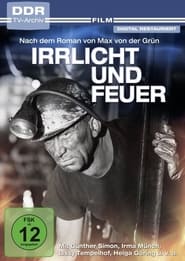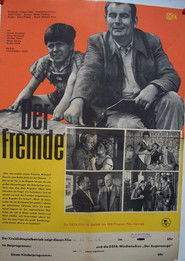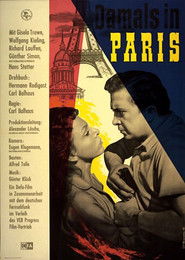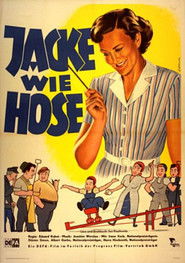detail profile g c3 bcnther simon
Peran Yang Di Mainkan Günther Simon
 Poor weavers Hans Horst Drinda und...
Poor weavers Hans Horst Drinda und...Das Kleid 1991
Poor weavers Hans (Horst Drinda) und Kumpan (Werner Lierck) try to enter a town surrounded by a tall, impenetrable wall, where everyone is apparently very happy. When they finally make it inside, the tyrannical Emperor Max demands they make him new clothes that would "bring all creatures to their knees." Hans and Kumpan claim only intelligent people can see the robe, and in order to prove himself clever, the emperor haughtily displays himself before his subjects wearing his new invisible regalia.
 Helmut Kamp the construction brigade leader...
Helmut Kamp the construction brigade leader...Ripe Cherries 1973
Helmut Kamp, the construction brigade leader, a man no longer young, life immediately confronted several difficult and woeful problems. The birth of a son, the tragic death of his wife, the relationship of his daughter Ingrid with Dr. Beißert coincided with the need to move to an uninhabited area where a nuclear power plant will be built. Kamp, Ingrid and the members of the friendly brigade decide to act as the duty and the feeling of partnership prompts them, and gradually they all become participants in the new construction...
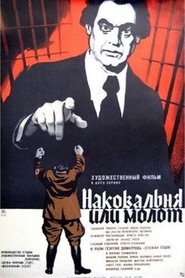 This is a political picture about...
This is a political picture about...Hammer or Anvil 1972
This is a political picture about the Bulgarian revolutionary Georgi Dimitrov. In 1933 during the Reichstag Fire Trial trumped-up charges of having set the Reichstag on fire were brought against him. At the trial Dimitrov exposed the machinations of the Nazis and turned from a defendant into an accuser. Central to the story is the face-to-face political duel between Dimitrov and Goering. Dimitrov's interactions with ordinary Germans, the memories of his wife Lyuba Ivoshevich, and the meetings with his mother Parashkeva alternate with documentary shooting scenes from the time of Nazi Germany.
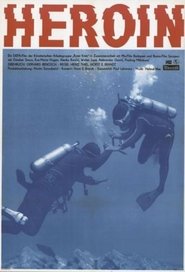 This East German movie was coproduced...
This East German movie was coproduced...Heroin 1968
This East German movie was co-produced with studios in Hungary and Yugoslavia, with many interesting location shots (border checkpoint to West Berlin, the Gellert bath in Budapest, and more). The plot is about French drug dealers, who obtain heroin somewhere in the Middle East, and smuggle it in several steps to East Berlin, and from there to France (or so it appears), killing when necessary. The hero is an officer of East German customs, who with detective work, some masquerade, and occasional violent action ultimately unravels the whole network, of course with the support of the local customs departments.
 Was it an act of sabotage...
Was it an act of sabotage...Der Frühling braucht Zeit 1965
Was it an act of sabotage or willful negligence? The non-party engineer Heinz Solter is suddenly arrested and accused of approving a defective pipeline that caused a half million loss to his company. At first, the case seems clear-cut for the state prosecutor, but when he probes deeper, he discovers that Solter had acted against his better judgment due to the pressure from his career-driven and authoritarian boss.
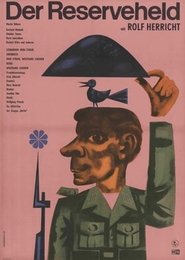 The famous actor Ralf Horricht is...
The famous actor Ralf Horricht is...Der Reserveheld 1965
The famous actor Ralf Horricht is a pain in his current director's butt while shooting a comedy about the army. So Horricht believes it a joke, when he receives an induction-order as reserve-officer... but the captain tries his best to make him realize this is no laughing matter.
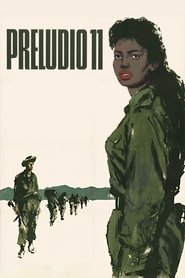 Daniela a single mother whose boyfriend...
Daniela a single mother whose boyfriend...Preludio 11 1964
Daniela – a single mother, whose boyfriend left for the US – believes wholeheartedly in Cuba's revolutionary new order. Meanwhile, in Florida, a plot is afoot. Under the command of an American officer, four Cubans ex-patriots and a Guatemalan land on the Cuban coast to prepare a US invasion of the island. Daniela's superior, the corrupt Cuban officer Palomino, is secretly helping the invaders and the young woman becomes entangled in the intrigue.
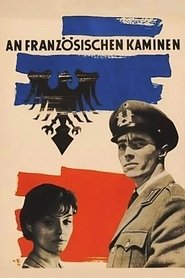 Bundeswehr soldier Klaus regiment is stationed...
Bundeswehr soldier Klaus regiment is stationed...At a French Fireside 1962
Bundeswehr soldier Klaus’ regiment is stationed in France, to take part in NATO maneuvers. The soldiers are ordered to be kind to the populace, since the West German High Command wishes the French to forget the atrocities that were committed during the Second World War. Klaus falls in love with Jeanne, the daughter of the local mayor. He discovers that his commanders intend to demolish the ruins of a local church, in which civilians were murdered by the German occupation forces at 1944. A local journalist who researches the event discovers that West German General Rucker ordered the massacre, but he is mysteriously murdered. Klaus defies his commanding officer Siebert, who instructs him to steal the documents indicting Rucker, and hands the evidence over to Jeanne.
 Two boys are helping the border...
Two boys are helping the border...The Moorhound 1960
Two boys are helping the border guards to find a mysterious moor hound used by spies to transfer messages across the border.
 A mysterious magnetic spool found during...
A mysterious magnetic spool found during...First Spaceship on Venus 1960
A mysterious magnetic spool found during a construction project is discovered to have originated from Venus. A rocket expedition to Venus is launched to discover the origin of the spool and the race that created it.
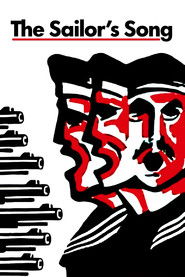 A film about the historical uprising...
A film about the historical uprising...The Sailor’s Song 1958
A film about the historical uprising of the seamen in Kiel: During the Russian October Revolution of 1917, German and Russian soldiers start to solidarize with each other. By disarming the officers, machinist Henne Lonke and stoker Jens Kasten prevent the attack on a Russian freighter. When German admiralty gives out orders for operation "Nibelungen", which would lead the German fleet into a suicidal attack against England and quell the revolutionary spirit, seamen and soldiers from different political backgrounds unite in protest.
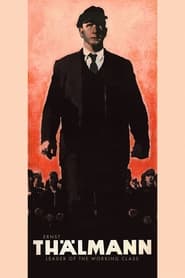 This film is the second of...
This film is the second of...Ernst Thälmann – Leader of the Working Class 1955
This film is the second of a two-part historical and biographical portrait of the communist politician and anti-fascist Ernst Thälmann. Autumn, 1918: Somewhere on Germany’s western front, Ernst Thälmann, age twenty-four, is calling on his fellow soldiers to put down their guns and join him in the communist struggle at home. When Hamburg’s Police Commissioner blocks a much-needed food shipment to the workers of Petrograd, Ernst battles to see it allowed through. Until his murder on August 18, 1944, Ernst remained true to his political convictions in the face of many setbacks.
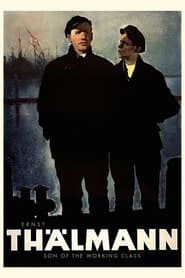 This film is the first of...
This film is the first of...Ernst Thälmann – Son of the Working Class 1954
This film is the first of a two-part historical and biographical portrait of the communist politician and anti-fascist Ernst Thälmann. In early November 1918, Ernst Thälmann is an unwilling soldier serving on the western front. As the revolutionary movement at home is threatened by the betrayal of the Social Democrats and fissures in the working class, Thälmann calls on his fellow soldiers to put down their weapons and unite with the workers in the communist struggle at home. Thälmann’s qualms about which side he is fighting on continue, but when the local police attempt to prevent a shipment of provisions and supplies from reaching the people in Petrograd, he intervenes and the ship is unloaded. With this moment of clarity, Thälmann continues to follow his political convictions and joins the workers at the Hamburg uprising in October 1923.
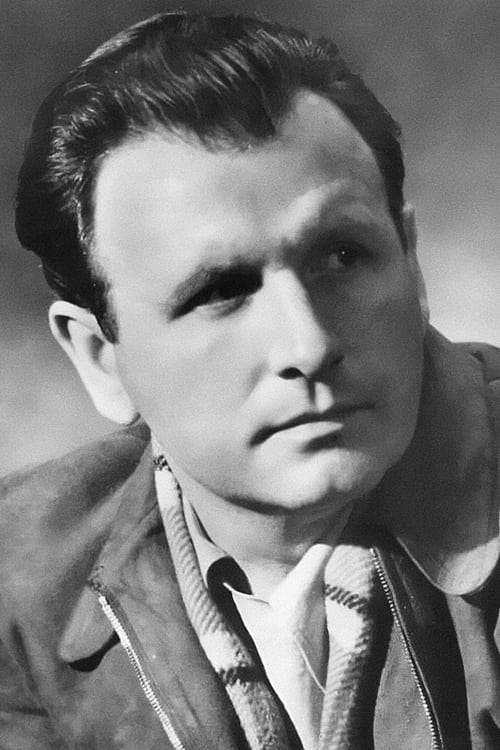
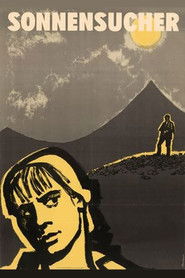 A socialist story of atoms for...
A socialist story of atoms for... East German television film
East German television film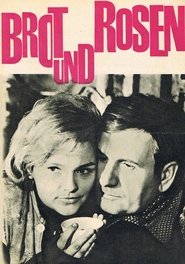 Film by Thiel and Brandt
Film by Thiel and Brandt